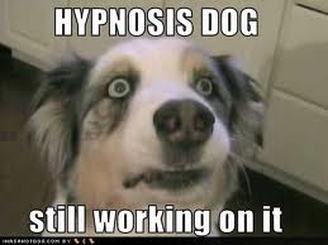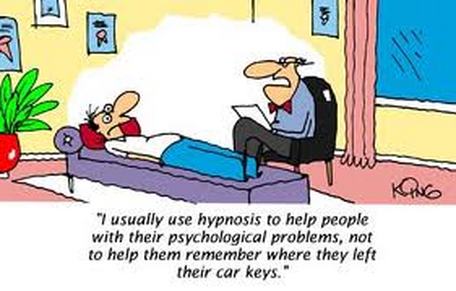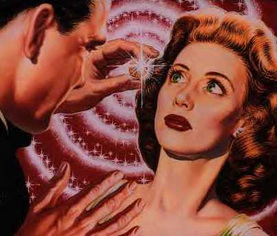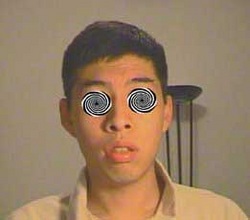Questions and Answers About Hypnosis

Are the Results of Hypnosis Permanent?
Suggestions stay with some individuals indefinitely, while others need reinforcement. The effects of hypnosis are cumulative: The more the techniques are practiced and post-hypnotic suggestions are brought into play, the more permanent the results become. Self-hypnosis training and reinforcement tapes for home use also provide additional help.
Can Any Person Be Hypnotized?
People of average intelligence (unless there is some form of organic brain damage) can be hypnotized in most cases if they are willing and do not resist. The depth of hypnosis varies with a person's ability to respond. If you are not a naturally responsive subject, you can improve your receptivity to hypnosis with practice. People who are paranoid, or who can not concentrate for more than a few seconds may be difficult to hypnotize, although hypnosis can be very effective in children with ADHD.
Can People "be controlled' while hypnotized ?
No way. If that were the case I would have long since hypnotized all my friends and family to behave in ways I want, and to obey me without question. But my family and friends are just as annoying to me as yours are.
You are in control the entire time while experiencing hypnosis. The power lies in your mind, because while under hypnosis you have greater awareness than when you are fully awake and you retain all the power to select what you want to say or do. You won't do anything in a hypnotic state that you would not find acceptable in your normal awake state. People who do silly things in public for a stage hypnotist are volunteers, who are aware that they have just volunteered to act silly. If the hypnotist asked them to do something they were not comfortable with, they would just wake up from the trance and be no more likely to obey the hypnotists suggestion than a suggestion from anyone else.
Does a Person Become Unconscious or Lose Control During Hypnosis?

Actually the opposite is true, as you are gaining control over mental functions most other people are scarcely aware of. Contrary to popular myth, you will never tell secrets you want to keep to yourself or accept suggestions that are not in your best interests. Also, you will be awake the entire session and will be able to recall all that took place. You are always in control.
How Does Hypnosis Help People?
The ability to reprogram emotional attitudes and reactions is a latent talent within every human being. Hypnosis is the most functional and reasonable way to train life-long attitudes, rather than suffer a lifetime of emotional accidents the conscious mind is unable to change.
How Does the Subconscious Accept Hypnotic Suggestions?
Hypnotic suggestions bypass the intellectual mind, called the "conscious," and zero in on the subconscious. When given a new suggestion that is within the bounds of a person's belief system and moral orientation, the subconscious mind accepts it literally as a new reality. Hypnosis works particularly well on children because they have such active imaginations.
How Effective Is Hypnosis Counseling?
A survey of psychotherapy literature by noted psychologist Alfred A. Barrios, Ph.D. revealed the following recovery rates:
Psychoanalysis: 38% recovery after 600 sessions.
Behavior Therapy: 72% recovery after 22 sessions.
Hypnotherapy: 93% recovery after 6 sessions.
Source: American Health Magazine
In What Areas Is Hypnosis Helpful?

Some areas where hypnosis is helpful include:
General
Anxiety, panic, phobias
Unwanted habits and addictions
Disrupted sleep patterns
Lack of confidence and low self-esteem
Fear of examinations and public speaking
Allergies and skin disorders
Migraine and irritable bowel syndrome.
Assistance with pain relief and anesthesia
Speeding of healing
Pain control
Mental Blocks & Emotional Problems
Memory Recall / Accessing Your Untapped Mental Abilities
Confidence / Self-Esteem
Learning Skills / Study Habits
Intensity Of Focus / Emotional Clearing
Mental Attitude / Letting Go
Public Speaking Ability / Anxiety
Motivation / Writer's Block
Attention Span / Using Your Potential
Tension / Stress
Creating Exercise Patterns / Achieving Goals
Relationship Problems / Self-Sabotage
Assertiveness / Concentration
Blushing / Shyness
Guilt / Release of Emotional Traumas from Childhood
Ability to Grieve Effectively / Trauma Release
Health & Wellness Issues
Weight Loss
Smoking cessation
Sleeping Problems
Breathing Clearly
Hearing Problems
Preparation For Surgery
Rapid Healing After Surgery
Promote Healthy Habits
Headaches
Chronic Pain ( Including phantom pain )
Irritable Digestion
Arthritis
Skin Problems
An Easier Experience of Chemotherapy
Allergy and Asthma Release
Easy Childbirth
Coping with Illness
Hidden Healing -- Heal Without Discussing The Problem!
Habits, Phobias, Fears & Addictions
Emotional Eating
Habits like: Nail Biting, Teeth Grinding...
Addictions – Gambling, Alcohol, Smoking, Drugs...
Fears of: Flying, bugs, animals, falling, heights, closed spaces, etc.
Spiritual Journeys & Finding Life's Purpose
Past Life Regression
Present Life Regression
Future life Progression
Hypnotherapy for Sports Performance
Hypnotherapy can improve focus and motivation that can make the difference in being the best at what you do or not. Many top pro-athletes use hypnotherapy to excel at their game.
Golf (Focused Driving and a concentrated Putting Game.)
Tennis Game
Basketball
Skiing
Hockey
Football
Ice Skating
Track and Field
Bowling
Any sport where the mind utilizes focus and motivation
Hypnosis and hypnotherapy (hypnosis therapy) are becoming more and more accepted in North America. In some places in the world it has been used for thousands of years. Have confidence knowing that, our mission is to provide the best of hypnosis practices and techniques and at the same time to utilize all of my professional training, background and knowledge in helping you connect with your mind/body healing abilities. We want to help you live the life you derives, happy, healthy, relaxed and successful.
Visit all the areas of this site and change your mind! Open up to new possibilities regarding the uses of hypnosis. Learn how to use hypnosis.
Is Hypnosis Dangerous?
No. The induction of hypnosis is never dangerous to the subject, although personal disappointments may arise because of unrealistic expectations or preconceived information.
Is Hypnosis Medically Approved?
Yes. The American Medical Association and the American Psychiatric Association have approved hypnotherapy for use by professionally responsible individuals. The British Medical Association also adopted hypnosis as a viable therapeutic tool in 1958.
Isn't Hypnosis Just Relaxation?
Contrary to popular belief, you do not necessarily even have to be relaxed during hypnosis. It is easier (and more pleasant) to experience hypnosis while relaxed, but hypnosis can be accomplished while you are tense. Hypnosis has to do with concentration far more than relaxation.
What Are Common Hypnosis "Scams"?

Example of a hypnosis scam
Because hypnosis has the power to alter important aspects of your life, it is vital for you to protect yourself from the "quacks" that are unfortunately so abundant in the field of hypnosis.
The best thing you can do is educate yourself on hypnosis and its legitimate uses so no one can mislead for a sale.
Here are a few tips to start with:
Scam #1: Audio Products that Seem Impossible
You might have seen products promising to do things which seem almost impossible. We have seen products claiming to:
- Grow Your Penis
- Make you Taller (no kidding!)
- Give you luck
- Make you financially successful
- Increase your psychic ability
Some of these products have some theoretical basis. For example penis growth might be theoretically possible, but there has been no research supporting such a claim. Furthermore, it is doubtful that the actual hypnotist's program has ever been researched in any analytical manner. Other products, such as promises of getting lucky, rely on New Age beliefs in order to convince you that hypnosis can open you up to Universal energies.
Scam #2: Certified Hypnotherapists
A Certified Hypnotherapist is really a misnomer. Most states and provinces do not even have licensing in hypnotherapy – this is why the importance of the therapist being licensed in another regulated therapy is paramount. A "CHT" may be certified and claim to have received 200 or more hours of training from an institution (roughly 5 weeks of full time work), but licensed health care professionals typically have seven to nine years of university coursework, plus additional supervised training in internship and residency programs. Their hypnosis training is in addition to their medical, psychological, dental or social work training.
Scam #3: Hypnotherapists with Questionable Educations
There are many "institutions" that provide students with PhDs, MAs, etc. that may be registered as a school in their state, but that are not accredited by any governing body in regards to what standards their graduates must meet to be licensed mental health professionals. While this might be acceptable for many trades, medical and mental health professions need strict regulation to ensure the quality of care you are receiving!
Scam #4: Subliminal Messages
According to The Journal of Public Policy & Marketing, two double-blind studies have tested subliminal message self-help audiotapes claiming to improve memory, increase self-esteem, or induce weight loss. Actual content and labeled content were independently varied; some subjects believed they were using memory tapes but were actually using weight loss or self-esteem tapes, and so on. After a month of use (per manufacturers' recommendations) by volunteer subjects, there were no effects of subliminal content in the claimed direction on any of the three dimensions.
What Do You Mean by "Hypnosis Is a Tool?"

Hypnosis and selection of a therapist can be analogous to a surgeon and scalpel . . .
A scalpel is a blade used in surgery by qualified surgeons. However, without the proper training, the tool is useless, and possibly dangerous. If you were going into heart surgery, you would make sure that the surgeon using this tool had spent years at a legitimate institution learning everything that he/she needed to know about heart surgery. This requires a complete education and training until demonstrating his/her competence. The same goes for someone using hypnosis. A hypnotherapist should have years of training in mental health before even attempting to use hypnosis as a tool for helping people make life changes.
What Does Being Hypnotized Feel Like ?

Most clients report pleasant feelings of mental and physical relaxation, similar to those moments before we fall asleep at night. You will be relaxed, yet still aware and able to respond if you need to.
Most people coming out of a trance describe it as a feeling of deep relaxation and comfort. I have had one patient describe it as the relaxed feeling you get after "a whole day of really good sex".
What if I Don't Wake Up?
No one has ever gotten stuck in a terminal state of hypnosis. It simply cannot happen. If the hypnotist left the room, or if you were listening to a tape and the power went out, you would realize it after awhile, wake up from the trance on your own, and hopefully check to make sure your hypnotherapist has not just had a heart attack. It is no more difficult awaking from hypnosis on your own than waking up from a relaxing daydream in the warm sun.
What is Hypnosis ?

Finding a definition of hypnosis that everyone agrees with is virtually impossible. Here are multiple different definitions from various sources.
From William Broom, Chief Executive & Registrar, The General Hypnotherapy Standards Council:
Hypnosis is a state of mind, enhanced by mental and physical relaxation, in which our subconscious is able to communicate with our conscious mind. It is widely accepted as a most excellent method by which we may access our inner potential. The state of mind referred to may be brought about either by oneself, unaided (self-hypnosis) or with the help of another person.
From Eric Greenleaf Ph.D.:
The notion of hypnosis is to help a person, by focusing and searching inwardly, to utilize all his learning and skills to resolve his problems, and to do so with the aid of unconscious learning and understanding. What scientists do when they "dream up" inventions and theories, what statesmen do when they "sleep on it" before solving problems of state, what athletes do preparing for a match by "visualizing" the flight of the ball‹this is the sort of thing hypnotized persons do to apply themselves to difficult problems of living.
Hypnosis is based on respect for us as a whole organism, in all that complexity and unique experience that has made us who we are. It may be thought of as a state of mind which can imitate many of the original and useful actions of the mind, body and spirit. In hypnotic trance a person may experience reduced pain, heightened sensation, strong emotion, remembering and forgetting, imaginings and creativity and an enhanced sense of self. Hypnosis points people toward those capacities within themselves and the learning they contain.
From Krasner, A.M. The Wizard Within: ABH PRESS, 1990/1991:
Hypnosis is "a process which produces relaxation, distraction of the conscious mind, heightened suggestibility and increased awareness, allowing access to the subconscious mind through imagination. It also produces the ability to experience thoughts and images as real."
Healing by trance state (hypnosis) is one of the oldest phenomena known to man and is found, in one form or another, in virtually every culture throughout the world. The hypnotic state is, in most respects, entirely dissimilar to sleep.
From William Broom, Chief Executive & Registrar, The General Hypnotherapy Standards Council:
Hypnosis is a state of mind, enhanced by mental and physical relaxation, in which our subconscious is able to communicate with our conscious mind. It is widely accepted as a most excellent method by which we may access our inner potential. The state of mind referred to may be brought about either by oneself, unaided (self-hypnosis) or with the help of another person.
From Eric Greenleaf Ph.D.:
The notion of hypnosis is to help a person, by focusing and searching inwardly, to utilize all his learning and skills to resolve his problems, and to do so with the aid of unconscious learning and understanding. What scientists do when they "dream up" inventions and theories, what statesmen do when they "sleep on it" before solving problems of state, what athletes do preparing for a match by "visualizing" the flight of the ball‹this is the sort of thing hypnotized persons do to apply themselves to difficult problems of living.
Hypnosis is based on respect for us as a whole organism, in all that complexity and unique experience that has made us who we are. It may be thought of as a state of mind which can imitate many of the original and useful actions of the mind, body and spirit. In hypnotic trance a person may experience reduced pain, heightened sensation, strong emotion, remembering and forgetting, imaginings and creativity and an enhanced sense of self. Hypnosis points people toward those capacities within themselves and the learning they contain.
From Krasner, A.M. The Wizard Within: ABH PRESS, 1990/1991:
Hypnosis is "a process which produces relaxation, distraction of the conscious mind, heightened suggestibility and increased awareness, allowing access to the subconscious mind through imagination. It also produces the ability to experience thoughts and images as real."
Healing by trance state (hypnosis) is one of the oldest phenomena known to man and is found, in one form or another, in virtually every culture throughout the world. The hypnotic state is, in most respects, entirely dissimilar to sleep.
What is the difference between Hypnosis and Psychotherapy ?

Hypnosis uses trance, suggestion and instruction in self-hypnosis to adjust and correct unwanted habits of thought, feeling and behavior. Psychotherapy is the diagnosis and conversational treatment of mental disease. In other words, a psychotherapist treats people who have been diagnosed with some type of mental illness while hypnosis addresses the habits of normal people wishing to improve their lives. The term "hypnotherapy", in most cases, is reserved for psychotherapists who integrate hypnotic techniques into the work they do with people who have emotional and mental disorders. Quite often this can decrease the time a person needs to spend in therapy.
What Is the Difference Between Meditation and Hypnosis?

Both techniques will take you into the meditative state. However, in meditation the goal is to remain there, while in hypnosis you use this state to change thought, ideas, and behaviors.
Will I forget everything during the session

It occasionally happens that there is amnesia for the session. Most hypnotists want you to be aware of the session. You will be aware of everything around you, and remember most, if not all, that happened in the session.
Usually, you will remember it better than a conversation we had, because your mind is in such a focused state. One of the ways I am taught at hypnosis courses is by the instructor hypnotizing the entire class, and teaching us how to do a specific type of trance while we are in that type of trance. This works so well that I can remember in detail courses that I took many years ago, whereas I sometimes have trouble remembering names of family members otherwise.
Occasionally hypnosis will unmask a painful memory, and it may not be appropriate for your conscious mind to remember it. If this happens you and the hypnotherapist can agree that you be given a post - hypnotic suggestion that you not remember the memory until you are ready. So you forget the memory, but only because you have voluntarily agreed to while in the trance. The hypnotherapist can not make you forget anything you do not wish to.
And if you like, you can have the sessions recorded or video'd. Or bring a friend along to take notes. Just make sure the friend pays attention and doesn't lapse into the trance as well. I have often had spouses come to protect their "significant other" from "that hypnosis crap" , and they have gotten into a better trance than the original patients.
This is because the sidekicks often don't actually believe that anything is going to happen, and therefore don't worry about "being good at hypnosis" or "co-operating" at getting into a trance. They just relax and take it easy, and that often makes them a better subject than someone who is desperately trying to help me out at hypnotizing them.
Usually, you will remember it better than a conversation we had, because your mind is in such a focused state. One of the ways I am taught at hypnosis courses is by the instructor hypnotizing the entire class, and teaching us how to do a specific type of trance while we are in that type of trance. This works so well that I can remember in detail courses that I took many years ago, whereas I sometimes have trouble remembering names of family members otherwise.
Occasionally hypnosis will unmask a painful memory, and it may not be appropriate for your conscious mind to remember it. If this happens you and the hypnotherapist can agree that you be given a post - hypnotic suggestion that you not remember the memory until you are ready. So you forget the memory, but only because you have voluntarily agreed to while in the trance. The hypnotherapist can not make you forget anything you do not wish to.
And if you like, you can have the sessions recorded or video'd. Or bring a friend along to take notes. Just make sure the friend pays attention and doesn't lapse into the trance as well. I have often had spouses come to protect their "significant other" from "that hypnosis crap" , and they have gotten into a better trance than the original patients.
This is because the sidekicks often don't actually believe that anything is going to happen, and therefore don't worry about "being good at hypnosis" or "co-operating" at getting into a trance. They just relax and take it easy, and that often makes them a better subject than someone who is desperately trying to help me out at hypnotizing them.

